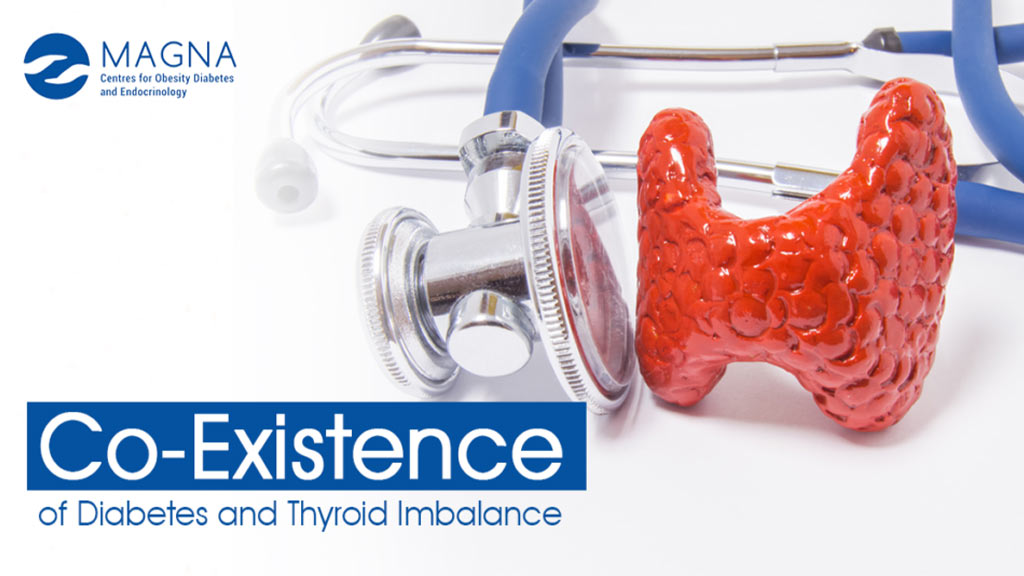
-
Posted By magna
-
-
Comments 0
Co-Existence of Diabetes and Thyroid Imbalance
The Thyroid is an endocrine gland present in the throat, which is responsible for the production and balancing of the T3 and T4 hormones in the body that affect the functioning of the body cells, weight and mood swings. An imbalance of these hormones can either cause hypothyroidism (underproduction of hormones) or hyperthyroidism (overproduction of hormones). If proper treatment is not received at the right time thyroid imbalance can lead to life threatening diseases such as cancer. Approximately over 6% of the population have some type of thyroid disorder.
Diabetes, on the other hand, is a condition that adversely affects the body’s ability to process blood glucose/sugar. There are three major types of diabetes namely; diabetes 1, diabetes 2 and gestational diabetes each having different impacts on the body.
As thyroid imbalance affects the body metabolism it has a prominent impact on control of diabetes. People with diabetes have a higher chance of being affected by thyroid imbalance. The chances of developing a thyroid disorder increase by over 10% in people with a diabetic condition.
The specialist endocrinologists at Magna Code gives a few pointers on how Thyroid imbalance affects different types of diabetes.
Thyroid and Type 1 Diabetes
People with one autoimmune disease are more likely to develop other autoimmune diseases. Especially people with type 1 diabetes have a greater chance of also developing a thyroid problem. Up to 30% of women with type 1 diabetes have some form of autoimmune thyroid disorder.
Thyroid and Type 2 Diabetes
The association of thyroid with type 2 diabetes still remains unclear. However, it has been noticed that there is a higher occurrence of hypothyroidism in people with type 2 diabetes.
Postpartum thyroid and Diabetes
Postpartum thyroiditis a form of autoimmune thyroid disease that causes thyroid dysfunction within a few months after delivery of a child, it is three times more common in women with diabetes.
Effects of Thyroid on Diabetes
Hypothyroidism typically results in worsening of the blood sugar levels and an increased need for insulin. Since hypothyroidism leads to a rapid heart rate it increases the risk of abnormal heart rhythm in diabetic people as they are already more prone to heart diseases.
Hypothyroidism if left untreated for a long time also leads to other complications such as osteoporosis or bone thinning. People with osteoporosis have a higher risk of bone fractures which make even a slight fall or hurt dangerous.
Furthermore, people with diabetes who have peripheral neuropathy are at a higher risk of falls due to loss of sensation or a loss of stimuli to the brain that tell where the body plan is in space or in a relation of an object. Thus, a diabetic condition in the combination of hypothyroidism, especially when neuropathy is present elevates the risk of fractures leading to even permanent disability.
Thyroid, Diabetes, and Pregnancy
Pregnancy-related thyroid dysfunction is three times more probable in women with diabetes and should be expected in every woman with type 1 diabetes.
Women with hypothyroidism who already take thyroxine medication before pregnancy often find a need for increased doses during pregnancy. As adequate thyroxine replacement is important for the baby’s neurological development.
It is advisable to undergo proper treatment and regular diagnosis to keep your condition from worsening.
Contact our endocrinologist at MAGNA CODE today to schedule an appointment and ensure yourself the best treatment and guidance.



